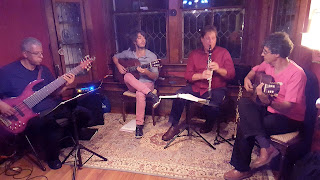 On Saturday night the energy of Rio filled
my Mount Pleasant row house. Furniture
cleared-out, carpets rolled-up, my dining room was transformed into a salon de choro; and my guests and I were treated
to a concert and masterclass on this special, antecedent genre of Brazilian
music.
On Saturday night the energy of Rio filled
my Mount Pleasant row house. Furniture
cleared-out, carpets rolled-up, my dining room was transformed into a salon de choro; and my guests and I were treated
to a concert and masterclass on this special, antecedent genre of Brazilian
music.
After the first lively, toe-tapping tune,
in a question-answer with the musicians, we in the audience were surprised to discover
that this choro music was originally composed
and played in the late 19th century.
It sounded so modern, so 21st century.
Choro, which means cry in
Portuguese, the band members explained, was rooted in the compositions of Ernesto
Nazareth, a pianist from Rio de Janeiro, who was highly influenced by
Chopin. He blended African and European rhythms to create a unique and
danceable sound he called ‘Brazilian tango’, and began his career playing his
pieces in cafes, at balls and society parties and in the lobbies of movie
theaters.
Despite the name, choro music actually has
a happy, upbeat rhythm characterized by sometimes complex syncopations, counterpoints
and improvisations. Another
theory on the name choro is that it derives from the term choromeleiro, which were slave ensembles hired out for parties
during the colonial era.
Apparently, there’s no crying allowed in choro!
We definitely were not crying on Saturday night. Our band leader, Rogerio Souza,
guitarist and master of the choro style, also a Carioca (native of Rio), had arranged
all the pieces on the program, many of which were Nazareth’s (which he
pronounced Nazaray).
The band, comprised of Souza on lead
seven-string guitar, his protégé Edinho Gerber also on guitar, Leonardo Lucini,
Brazilian-born local on seven-string bass, Andy Connell, professor of music at
James Madison, and the ever-magnanimous Gigi Rezende MacLaughlin on rebolo drum, was a marvel of
improvisational energy. They handled the complex, syncopated rhythms
masterfully, handing the baton smoothly from one lead to the next, and filling my
house (with no amplification necessary) with this happy, virtuoso sound.
The audience responded with reverence,
leaning forward in their chairs, hanging like lovers on every note, and at
times, unable to contain a response, ohhing, ahhing and clapping after solos to
egg the musicians on. It was that symbiosis between creation and
appreciation that makes one feel part of something bigger – certainly bigger
than a little, intimate house concert in Mount Pleasant.
But by the last tune of the night, after a
few glasses of wine and two sets of sublime choro, it was too hard to contain
the energy any longer. Gigi’s drum
beating, 20-strings strumming, and
Andy’s horn wailing, we spectators were up on our feet, moving our limbs on my
tiny dining room dance floor.
It was a tune by Baden Powell, a more
modern choro composer, called Lapinha,
which refers to a favela in Salvador, Bahia. The lyrics, by Paulo César
Pinheiro, say: ‘When I die, bury me in
Lapinha.’ In myth, Baden Powell, who died in 2000, got his wish; but in fact,
as Professor Connell points out, Powell was buried in São João Batista cemetery
in Botafogo, Rio de Janeiro.
Catch Rogerio Souza’s choro combo on Friday
night at Montpelier Arts Center in Laurel, MD before he departs for the Midwest
and West Coast. You’ll be glad you did. Tickets at http://www.goldstar.com/washington-dc/events/laurel-md/rogerio-souza-quartet-tickets